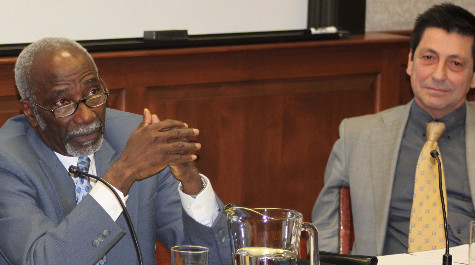Legal Reform in Haiti: "Life Goes On and Justice Cannot Stop"
Legal reform efforts must continue in Haiti despite last month's massive earthquake, two experts said during a Feb. 15 panel sponsored by the Law School's Program in Comparative Legal Studies and Post-Conflict Peacebuilding. The event was co-sponsored by the Black Law Students Association and the International Law Society.
René Magloire, a Haitian diplomat who serves as Special Advisor to President René Préval, and Louis Aucoin, an American professor from the Fletcher School of Law and Diplomacy and a leading expert on constitution-making in post-conflict societies, spoke about legal reform in Haiti accomplished prior to the earthquake and the need for reform efforts to continue. The two are part of a three-member team collaborating on a project supported by the United States Institute of Peace to modify Haiti's penal code and code of criminal procedure.
Speaking through a translator, Magloire described the earthquake's toll: as many as 200,000 people were killed and several hundred thousand injured. Haiti's legal community was not spared. "Judges, attorneys, bailiffs, and clerks " died as the earthquake leveled the Ministry of Justice, and thousands of homes, as well as numerous courthouses, police stations, and government offices. Magloire, who was in Port-au -Prince at the time, recalled that the cataclysm was, at first, incomprehensible to survivors. "How could it be otherwise," he said, "for Haitians had lost their children, parents, relatives, friends, colleagues, and neighbors." A "tremendous spirit of brotherhood and sharing" has united his country since the disaster, he said. In addition, "the international community responded to the call from the President of the Republic and has expressed its solidarity. ... Ladies and Gentlemen, life goes on and justice cannot stop."
Magloire, who served as Haiti's minister of justice in 1995-96 and 2006-08, outlined progress made prior to the earthquake, which included, for example, the establishment of standards for judicial appointments and promotions, and the creation of a school to provide initial and ongoing training for magistrates. The government also had formulated plans to increase the number of police and penal officers and to improve working conditions and professionalism within these units.
"The country has some resources," he said, "but is lacking all the resources needed" to move forward with legal reform in the wake of the Jan. 12 disaster. "The challenge is huge."
Aucoin, who worked in Haiti in 1997-98 as a special advisor to the minister of justice and in 1999 in East Timor as an acting minister of justice in the transitional administration established by the United Nations, said reports from Haiti since the earthquake defied the imagination. "I felt a great loss," he said. "We have lost human life and infrastructure in a way that is just mind-boggling."
He applauded Magloire's report that Haiti's minister of justice had acted quickly to assess the damage to the nation's legal system after the earthquake. There are some similarities between the aftermath of natural disaster and the aftermath of war, Aucoin said. "Criminals will seize this opportunity ... so you have to get the justice system up and running as fast as possible." He told the audience that Magloire was widely acknowledged by those working in legal reform as being "at the center of the progress that has been made in Haiti."
"While Haitians have made inroads in legal reform," Aucoin said, "there is still work to do." However, he stressed that "all reform should be Haitian-centered. Haitians themselves should be at the center of coordinating assistance for the criminal justice system that is coming from the international community."
Christie Warren, director of the Program in Comparative Legal Studies and Post-Conflict Justice, expressed her admiration and respect for Magloire's commitment to the Rule of Law, even after such a cataclysmic event.
"Minister Magloire continued to work on revisions to the Code of Criminal Procedure in the weeks immediately following the earthquake, often working alone in his garden on a battery-powered laptop. He had barely escaped the devastation himself; his office collapsed to the ground in rubble immediately after he had left for the day on Jan. 12."
Warren said that following conflict and natural disaster, the temptation is often great to postpone law and justice issues until after basic humanitarian needs have been met. "Minister Magloire stands as a powerful symbol to the rest of the world that the irrepressible will of the Haitian people, in partnership with the global community, will carry the country out of destruction and into a more promising future."
